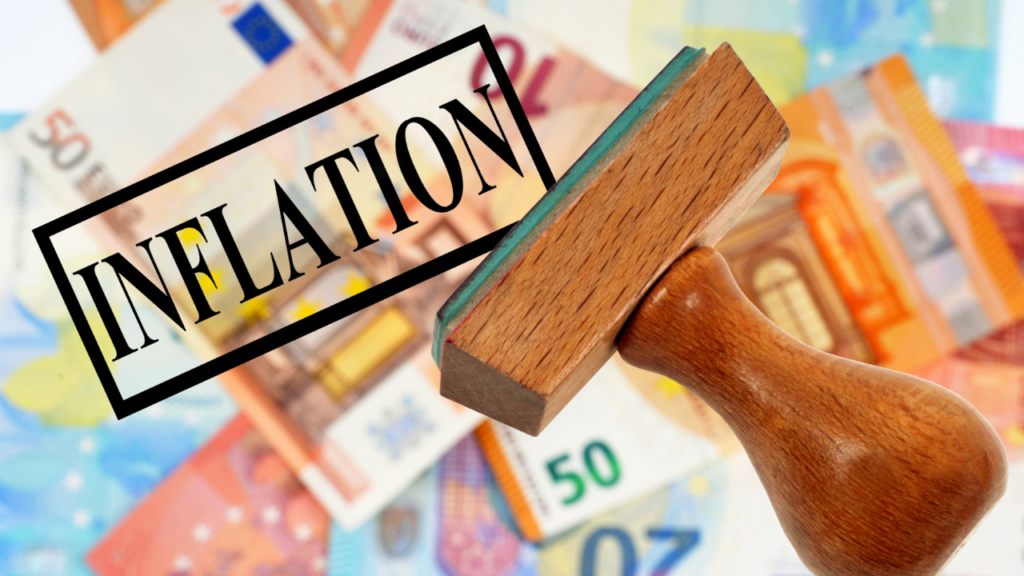Inflation is an economic phenomenon that affects everyone. Inflation is defined as a prolonged increase in general price level of goods and services. It is often tracked by the Consumer Price Index (CPI) and reported as percentage changes over time. When the price of products and services rises, the buying power of money decreases. This implies that the exact amount of money will purchase fewer products and services than it did previously. Inflation is a fact of life that we must all cope with.
While building wealth is crucial, it is also critical to safeguard your wealth and spend your cash wisely, especially during times of inflation. In periods of high inflation, your hard-earned money must be saved, invested, and spent wisely to maintain long-term sustainability and liquidity of your wealth corpus.

High inflation causes price increases, which affects our wallets and, as a consequence, credit card debt is also rising at the quickest rate. Increased demand in the market, supply chain issues, and the global political and economic crisis are all the key factors that stimulate high inflation. However, it is critical to realize that high inflation will not remain forever.
Though we can wait for inflation rates to stabilize, it is more vital to put your money to work for you during the times of inflation, by spending wisely and saving where you can.
According to some data, merely setting a monthly budget, analyzing your costs, and minimizing low-value items may add up to 15% headroom to most household budgets. Despite this, approximately 75% of people do not adhere to a budget on a regular basis.
We have little control over growing expenses in general. While you cannot influence the economy, you can attempt to reduce your spending and manage growing expenditures.
Here are the top five money management strategies for beating inflation and growing your wealth even in times of high inflation:
Tip No. 1 – Continue Investing:
One of the greatest and the foremost strategies to combat inflation is to invest your money. When you invest, you are putting your money into something that will grow over time. This can assist to mitigate the consequences of price increases over time. Inflation is often accompanied by a market decline. Many people are eager to sell in order to prevent financial loss. Making an emotional decision and selling your investments during a downturn will almost certainly reduce your long-term gains.

Instead, consider this as a chance to purchase equities which are “on sale” at a price that would not typically be available. Play the long game while keeping your emotions in check. You should also remember that you should invest the money that you will not require in the short to medium-term. Generally, you should plan for investment periods of three years or more.
Inflation is pretty regular, and it represents an excellent purchasing opportunity for the mid- to long-term investor. If you invest consistently when inflation puts downward pressure on the market, you will undoubtedly end up with more money in the long term.
Tip No. 2 – Diversify your investment portfolio:
Keeping all of your money in cash will not keep up with the average inflation rate of 6%. Investing is an important aspect of preserving your buying power over time, and some forms of investments may hedge against inflation.
As real estate has a tangible value, it may be used to hedge against inflation. However, investing in real estate involves a large sum of cash, and the returns from real estate are debatable when the inflation is low. Hence you may invest in a variety of low-cost index funds that can help you obtain more intrinsic value in the long term than just staying in cash.
Purchasing inflation-resistant assets can also be an excellent approach to preserve your money. In periods of strong inflation, certain assets, such as gold or other rare metals, tend to keep their worth well. However, we need to keep in mind that these investments come with their own set of risks that should be meticulously weighed before purchasing.
Tip No. 3 – Look for Promotional Opportunities in Your Organization:
Keeping up with inflation is the key to fighting it. You can look for opportunities for advancement within your organization and apply for that role you’ve been eyeing. Earning more money, whether through a side business or a promotion at job, will help you balance your budget. Most people forget that it is simpler to build a surplus of funds by generating more income than it is to reduce your petty expenses and cut back on life’s little modern conveniences.
Tip No. 4 – Make Time for Your Budget:

Budgeting is an important tool for managing your finances and coping with inflation. You must understand where your money is being spent in order to guarantee that you are spending it on the things that provide the greatest value for your life. Budgeting is more about taking control of your finances than it is about restricting your spending. As you record and track your income and expenses, you also need to check where you may be able to improve on either. Examine your budget for categories to delete or cut without feeling constrained. All of the additional money in your budget may either be utilized to cover next month’s bills or invested in income producing assets.
You can also set up automatic savings to assure that you are continually saving money with these additional cash in your account. This will assist you to consistently save for the future. You can find places in your budget where you can cut back and save money if you know exactly where your money is going. You may either need to save money without making major adjustments to your routine, or you may need to make more drastic changes, based on the outcome of your budgeting.
Tip No. 5: Altering your Purchasing Habits:
Adjusting your consumption patterns is another strategy to safeguard your money from inflation. This entails being aware of what you’re purchasing. You may, for example, look around for the cheapest prices, buy in bulk, or cut back on needless spending. You can reduce the impact of inflation on your finances by being cautious of your expenditures. It may look weird, but you can also try to adhere to a 24-hour rule. For any non-essential item, wait a day before buying. Items can remain in cart as you can reconsider if you truly need them. This will in fact reduce your impulsive buying.

When you are looking to purchase a long-lasting product, choose one that will not need to be changed or repaired anytime soon. Although your total cost may be greater, the investment may make your expenses more manageable over the course of your ownership.
To summarize this article, you can always anticipate inflation to affect you in some manner. High inflation has always challenged the financial wellbeing of families. Price increases will have an impact on your budget and money. So it’s up to you to decide how you intend to deal with the shift. As the value of money diminishes due to inflation, it is critical to have a clear grasp of the income and expenditures necessary to keep the family running.
While we as individuals may fear inflation, we can prepare for it. You have no influence over how the inflation in the economy increases or decreases, but you can make financial decisions in your day-to-day life which will assist you in controlling inflation. It is important to know how to cope with inflation and manage your finances effectively.





